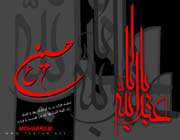| |

26- To miss a need is better than asking it from other than its people. Bad mannerism in a misfortune is more catastrophic than the misfortune itself.
27- As a man asked him a short item of instruction that collects the welfare of this world and the world to come, the Holy Imam (A.S.) said: Never tell untruths.
28- Imam As-Sadiq (A.S.) was asked about eloquence. He answered: Eloquence is to express the idea in as few as possible words. The eloquent is that who attains his demand in the least effort.
29- Debt is grief at night and humility in day.
30- If your worldly demands are attainable, you should check your religion.
31- Treat your fathers piously so that your sons will treat you piously. Keep yourselves away from the strange women so that your harem will be chaste.
32- He who entrusts a betrayer with a deposit will be deprived of Allah's warranty.
33- Imam As-Sadiq(A.S.) said to Humran-bin-A'yun: O Humran, look to him who is less powerful that you are and do not look at him who is more powerful so that you will be more satisfied with what Allah has allotted for you and will be a greater motive to deserve the Lord's increase. Know that little permanent deed with conviction is more favorable to Allah than the many deeds that are lacking conviction. You should know also that no piety is more profitable than avoiding committing the prohibited matters and the abstinence from harming and backbiting the believers. No living is more pleasant than good mannerism, no fortune is more advantageous than satisfaction with the sufficient and the little, and no ignorance is more harmful than self-conceit.
34- Pudency is of two faces: one is weakness while the other is power, submisison, and faith.
35- Negligence of others' rights is humility. Certainly, the neglector of rights needs for forgery in this regard.
36- It is sufficient for one of the group to salute. Similarly, it is sufficient for one of the group to respond the salutation.
37- Salutation is voluntary while responding is obligatory.
38- Do not answer those who speak before they greet you.
39- Shaking hands is the perfect greeting of the resident and embracement is the perfect greeting of the traveler.
40- Shake hands, because this will confiscate malice.
41- Fear Allah even if to some extent. Construct a screen between Him and you even if transparent.
42- As for those who control themselves in rage, desire, fear, and lust, Allah will prevent Hell from burning their bodies.
43- Good health is a light grace; it is forgotten when found and mentioned when missed.
44- In good days, Allah endows with the grace of consent. In distress, He endows with the grace of purification.
45- It often happens that Allah endows a servant with a grace that he does not expect. It also happens that one hopes for something while his goodness is in its opposite. It also may happen that one is running for his doom, while he goes slowly for his goodness.
46- He who does not show steadfastness against every misfortune, show gratitude for every grace, and show easiness for every complexity will surely be too short to continue. Be broad-minded whenever a misfortune inflicts you, whether in your son, wealth, or other matters. The fact of every misfortune is that Allah receives his loan and takes his gift back so as to test your tolerance and thanking.
47- Everything has limits. The limit of conviction is not to fear anything besides Allah.
48- The (Faithful) believer should enjoy eight characters; he should be venerable in shaking situations, steadfast against misfortunes, thankful in luxury, satisfied with what Allah has decided to him, avoid oppressing the enemies, avoid overtasing the associates, should fatigue his body, and make people feel glad with him.
49- Knowledge is the comrade of the faithful believer, clemency is his supporter, patience is the commander of his army, lenience is his brother, and charity is his father.
50- Imam As-Sadiq(A.S.) said to Abu-Ubayda who asked him to supplicate to Allah for saving him from making his earnings pass by the mediation of the servants: Allah has arranged to make people's earnings in other people's hands. You should supplicate to Allah to make your earnings in the hands of the charitable people, because this is a sort of happiness, and not to make your earnings in the hands of the vicious, because it is a sort of despondency.
Source: alhassanain.com

By: Saira Hussain
Rabi-ul Awwal 17 is the birth anniversary of holy Prophet Hazrat Muhammad (SAWW) and his sixth infallible descendant Hazrat Imam Jafer As-Sadiq (AS). Here is a little collection of some maxims of the Imam (AS):
1- He who treats people kindly will be accepted as arbiter.
2- To trust everybody in times of injustice and cheating is disability.
3- If problems are added to each other, they will give birth to relief.
4- To recognize the actuality of your friend, you should enrage him. If he keeps up his friendship, he is true friend lest, he is false.
5- Do not appreciate one's affection before you enrage him three times.
6- Do not trust your friend perfectly, because the knockdown of the trustful is incurable.
7- Islam is a definite rank. Faith is one rank higher than Islam. Conviction is one rank higher than faith. People have been given a rank lower than conviction.
8- To remove a mountain is easier than removing faith.
9- Beware of joking, because it causes rancor and drives into malice. Joking is the lesser revilement.
10- The desire for the worldly pleasures causes grief and sadness. Abstinence from the worldly pleasures brings about the rest of both heart and body.
11- Life is to rent a house and buy bread.
12- He who gains oppression is not gaining welfare. He who mistreats people should not complain when people mistreat him.
13- In homelands, exchanging visits is the means of association. In travel, correspondence is the means of association.
14- A believer is not perfectly virtuous unless he enjoys three characters-- knowledgeability of the religious affairs, moderation in living, and steadfastness against misfortunes.
15- An actual believer is that whose sexual appetite does not overcome him and whose stomach does not shame him.
16- A twenty-year friendship is kinship.
17- Favors should be done only to the highborn or the religious. Those who show gratitude are very few.
18- Enjoining good and forbidding evil should be practiced with a faithful believer that he would learn a lesson, or an ignorant that he would earn. Enjoining good and forbidding evil become surely worthless when they are applied to the powerful tyrants.
19- Those who enjoin good and forbid evil should enjoy three characters: they should be aware of the matters that they enjoin and the matters that they forbid,fair in the matters that they enjoin and the matters that they forbid, and lenient in the matters that they enjoin and the matters that they forbid.
20- He who suffers a misfortune due to obtruding upon an unjust ruler will be neither rewarded nor endowed with patience.
21- As some people showed ingratitude for Allah's graces, He changed the graces into crises. As other people showed steadfastness against the misfortunes that inflicted them, Allah changed the misfortunes into graces.
22- The prosperity of coexistence and association are three thirds: two thirds are acumen and one is overlooking.
23- Revenging on the pauper is extremely ugly.
24- Imam As-Sadiq(A.S.) was asked about personality, he answered: Personality stands for that Allah should not see you in situations against which He warned, and miss you in situations of which He ordered.
25- Thank him who did you favor, and confer upon him who thanked you. Graces that are shown gratitude will not be removed while those that are shown ingratitude will not persist. Thanks increase the graces and saves against poverty.
Source: alhassanain.com

When writing about the greatness of a personality, one needs a gold standard with which to compare the strengths and weaknesses of that individual. However, if that person is herself the gold standard, then it makes it impossible to adequately describe her greatness. Hazrat Fatimah (s.a) was such a personality. Her merits are unmatched by any woman known in history and Allah himself testifies in the Qur’an about her purity and piety.
The rest of the text in the next page...(ادامه مطلب)
ادامه مطلب...

Introduction
During their missions, all the Prophets and Apostles have emphasized the fact that a savior will arrive at the end of time who will implement the government of justice over the globe. This news has been heard since the human being appeared on the earth. Allah has indicated this promise in all the early scriptures and commanded humans throughout ages to wait for the manifestation of the kingdom of Allah. The Holy Qur’an also gives glad tidings of the day for ...
The rest of the text in the next page... (ادامه مطلب)
ادامه مطلب...

We also learn from Fatimah (A.S.), in her advanced missionary awareness and position, that she was someone who rebelled against her personal needs, however simple, for the sake of her missionary ambitions; she was someone who prioritized in favour of principles over the self. This is what we need to learn, for many of us - men and women alike - fall down when it comes to a choice between the needs of the principle and the needs of the self; we too often choose the self, and may even make a principle of service to the self.
Fatimah al-Zahra (A.S.) was unique in all her behaviour and deeds, even in her sorrow for her beloved, especially during her separation from the Messenger of Allah (PBUH).
Historians tell us that, when she went to him as he was dying, she embraced him and he whispered something in her ear which made her weep. Then, when he whispered something that made her laugh, she was asked:
'How quickly (your) laughing after weeping?!' She said: 'I shall not reveal the Messenger of Allah's secret in his life.' So, when she was asked about this after his death, she said: 'He whispered in my ear first that he was going to meet his Lord and that his soul was announced to him (his death), so I wept; then he whispered in my ear again that I was going to be the first of his family to go after him, so I laughed!'
Where else would you find a young woman, whatever her love for her father, become happy when he tells her that she is going to be the first to die after him?
What relationship deeper could be than this, and what unity of spirit could be stronger?
Source: alhassanain.com

Another narration by al-Hakim in al-Mustadrak states: 'The Messenger of Allah used, when he came back from a battle or journey, to come to the mosque and pray two rak'as to thank Allah..... then would enter to (the house of) Fatimah, then he would come to his wives'.
This meant that Fatimah (A.S.) held the prime place in the relationships between the Prophet (S.A.W.) and other people, including his wives.
In the same book, al-Mustadrak, al-Hakim also narrated: 'The Prophet (S.A.W.), when he used to travel, the last person he would see was Fatimah.'
Thus her image would stay in his mind, and the kindness and emotion, with which she used to embrace him, would stay with him in his travel and his memory, to comfort him.
Al-Hakim added: 'And when he returned from a journey, the first person he would see would be Fatimah.'
Historians have said that the Prophet (S.A.W.) did not accept that Fatimah (A.S.) became separated from him even after her marriage and, therefore, did not accept that she lived in a house far away from him, so she lived in the house next to his so that he could enter into her house directly from his.
In al-Isti'ab we read: ''Ayshah was asked: who was the most beloved person to the Messenger of Allah? She replied: Fatimah. I asked: and amongst men? She said: her husband...'
This is an important witness by 'Ayshah for Fatimah and Ali (A.S.).
There are many stories from her life which tell how she used to study her father's thoughts to know what he liked and disliked, what opened up his heart and what closed it. An example of this was when he (S.A.W.) came back from a journey and entered her house, looked around a little, then left. Quickly she knew that something bothered the Messenger of Allah (S.A.W.). She thought about it and realized that on the door of her house was a curtain and that she had two bracelets in her hands; she took the curtain down and took off the bracelets and sent them with her sons and said: 'Say greetings to my father and say to him: we have not introduced anything after you except this, it is for you to do with them what you like.'
When the Prophet (S.A.W.) heard this, his expression relaxed. He was moved by this generous, wonderful, spiritual gesture by his daughter, and this thoughtful response, and gave these things to the poor, saying: 'She did this! May her father be sacrificed for her! May her father be sacrificed for her! May her father be sacrificed for her! What have the family of Muhammad (S.A.W.) to do with life: they have been created for the hereafter!'
This is what every girl with a mission should learn, when her father is a man of missionary affiliations and responsibilities; as too should every woman with someone who has a missionary dimension in his life: she should learn not to get too engrossed with her own affairs, but to open herself up to the responsibilities of her father, husband, brother or son so as to join with him in the dynamic movement of responsibility, and not to add to the burdens to his responsibility. For we see many great men, past and present, become burdened by the people who are around them: while when they think in a missionary manner, those around them think only of themselves.
To be continued ...
Source: alhassanain.com

Fatimah (A.S.) was the only woman connecting Prophethood and Imamate and was the link between the two. She was the daughter of the Holy Prophet (PBUH), the wife of the first Imam (A.S.) and the mother of the rest of the Imams (A.S.) who descended from her and her husband Ali (A.S.). Allah singled her out with this virtue and peculiarity because she was the most perfect and highest example in purity, sanctity, worship, asceticism and morals.
Al-Kawthar
According to some Qur"an commentaries (tafsir), when the Quraysh (tribe) said that the Prophet (PBUH) had no offspring, the chapter of al-Kawthar was revealed: "Verily We have given thee the Kawthar (Abundance). So pray thou unto thy Lord! And offer sacrifice. Verily, thy enemy shall be the one cut off (in his progeny)." (Qur"an 108:1-3)
"We have given you al-Kawthar" means we have given you the abundant good, which shall last throughout your life and after it; therefore, turn your face unto your Lord in prayer, as mention of your name shall never end and your offspring shall never perish; it is those standing against you who are more deserving of this description.
This revelation was given against the backdrop of the pronouncements by some of the Quraysh"s most scurrilous men - such as al-"As bin Wa"il, Abu Jahl, "Uqbah bin Abi Mu"ayt and Ka"b bin al-Ashraf - that the Prophet (PBUH) was cut off from male children, after the death of his son al-Qasim. Hence, it is clear that the abundant good - al-Kawthar - was pointing to the abundant offspring which the Prophet (PBUH) would have through his daughter Fatimah (A.S.), and that this was a reply to those people and their effort to weaken the Prophet"s spirits.
Supporting our interpretation, al-Tabataba"i, in al-Mizan commentary, said: "Without that, the words "Verily, thy enemy shall be the one cut off" would be useless."
to be continued ...
Source: alhassanain.com

Dr. Fahimi: Mr. Hoshyar! Our friends know it. But let me tell you that I follow the Sunni school of thought. Hence the positive evaluation that you have of the Shia hadith-reports I do not share. In all likelihood extremist Shi’s for whatever reasons after having accepted the narratives about the Mahdiism must have fabricated traditions in support of their views and ascribed them to the Prophet. The evidence for my contention is that the traditions about the Mahdi are recorded only in your Shia books. There is no trace of these in our authentic --Sihah-- compilations. Yes I am aware that there are some traditions on the subject in our less reliable compilations. [13]
The rest of the text in the next page (ادامه مطلب).....
ادامه مطلب...

Such hadith-reports are abundant. The main idea that runs through all of them suggests that the topic about the future coming of the Mahdi and Qa’im during the time of the Prophet (peace be upon him and his progeny) was well known. In fact the way these reports speak about the subject indicates that it was not something new which was being presented to the people. On the contrary they relate the signs and characteristics of the person who would emerge as the Mahdi as in the statement "the promised Mahdi will be among my descendants."
The following traditions reflect such a pattern in their presentation. It is reported from Ali bin Abi Talib who said:
The rest of the text in the next page (ادامه مطلب).....
ادامه مطلب...

Devotedness
Fatimah (A.S) devoted herself to Allah and resorted to Him totally in all of her affairs. This was clear in her dua’a.
Her dua’a on turning to Allah
Fatimah (A.S) often supplicated Allah with this dua’a,
“O Allah, by Your knowing of the unseen and Your power over the creation, make me live if You know that life is better to me, and make me die if You know that death is better to me.
O Allah, I ask You for loyalty, and for the fear of You in pleasure and in anger, and for economy in wealth and poverty.
O Allah, I ask You for incessant bliss, and ask You for ceaseless delight, and ask You for satisfaction with fate, and ask You for a good life after death, and ask You for the looking at Your Face, and the eagerness to Your meeting without a harming distress or a dark sedition.
O Allah, adorn us with adornment of faith, and make us guided and guides, O You the Lord of the worlds!”
Her dua’a on resorting to Allah
She recited in this dua’a,
“O Allah, make me satisfied with what You have given to me, honor me and give me good health as long as You make me live, forgive me and have mercy on me when You make me die.
O Allah, do not afflict me with asking for what You have not determined for me, and whatever You have determined for me make it easy and accessible.
O Allah, reward my parents for me and whoever has done me a favor with the best of reward.
O Allah, take me to what You have created me for, do not make me busy with what You have already secured to me, do not punish me while I ask You to forgive me, and do not deprive me while I beg You.
O Allah, make me humble to myself, make Your standing great to me, and inspire me with Your obedience and the doing of what pleases You and avoiding what displeases You, O You the most Merciful of the merciful.”
Taken from the book called: THE LIFE OF FATIMAH AL-ZAHRA'
Source:coiradio.com

Allamah Majlisi says that I have read in some books, that when Imam Hussein (A.S) decided to leave Medina, Ummu-Salamah came to him and said, "O my dear son! Do not aggrieve me by going towards Iraq. For I have heard your Grandfather say that my son Hussein will be killed in Iraq at a place called Karbala." Imam replied:
"O dear Grandmother! I too am aware of it and I shall be forcefully killed while there is no escape from it. By Allah! I know the day when I shall be killed and recognize my murderer besides being aware of the Mausoleum where I shall be buried. And I know all those people among my family, relatives and followers who shall die along with me. Then Imam said:
"O Grandmother! Allah Almighty desires to see me killed and that my head be severed with cruelty and injustice. Besides (Allah) desires that my family and womenfolk be expelled, and my children oppressed, bare headed, arrested and bound in chains. And they would plead and call out for help, but none would come to their aid."
In another tradition it is stated that the holy Prophet (PBUH) gave some sand to Ummu-Salamah and said: when it turns into blood know that my beloved Hussein has been martyred.
Taken from the book named: NAFASUL MAHMOOM
By Haj Shaikh Abbas Qummi (a.r)

Chastity and veiling
Fatimah (A.S) was the highest example in chastity, honor, and veiling for all Muslim women.
Imam Ali (A.S) said, ‘Once, a blind man asked permission to visit Fatimah (A.S), but she asked him to stay behind a screen. The messenger of Allah (A.S) asked Fatimah (A.S), ‘Why did you screen him though he is blind and could not see you?’
She said, ‘He could not see me, but I could see him.’
The Prophet (A.S) said, ‘I witness that you are a part from me.’
Once, Imam Ali (A.S) asked Fatimah (A.S), ‘When is woman closer to her Lord?’
She said, ‘When she keeps to her house…’
Imam Ali (A.S) offered her answer to the Prophet (A.S) who said, ‘She is true. Fatimah is a part from me.’
Veil is beauty and honor for woman. Whenever woman adorns herself with chastity, she will be in a highest position and most honorable rank besides gaining admiration of the all. But if woman is unveiled and unchaste, she will be worthless in the society and no one will appreciate her. The veil and chastity of Fatimah (A.S) is a high example that every woman who wants to live regardable and honorable in the society.
Deep faith
Definitely, no one can suspect the unequaled faith and worship of Fatimah (A.S). She spent most of her days and nights in worshipping.
Imam Hassan (A.S) said, ‘some night, I saw my mother Fatimah (A.S) in her mihrab bow and prostrate (offer prayers) until the light of morning appeared. I heard her praying Allah for the believing men and the believing women and mentioning them by the name. She prayed Allah for them too much, but without praying for herself. I said to her, ‘Why do you not pray Allah for yourself mother?’
She said, ‘O my son, the neighbor (first) and then the house…’
Al-Hassan al-Basri said about Fatimah (A.S), ‘No one in the umma worshipped Allah more than Fatimah (A.S). She offered prayers in the night until her feet swelled.’
It was transmitted from Fatimah (A.S) her saying, ‘Whoever raises his true worship to Allah, Allah will send down to him the best of his benefit.’
Fatimah (A.S) assigned the last hours of the day of Fridays for Allah the Almighty. In the last ten days of Ramadhan, Fatimah (A.S) spent all the night in worshipping and supplicating, and she encouraged all those in her house to spend the night in worshipping and supplicating. Her feet swelled because of her long standing before Allah the Almighty.
Taken from the book called: THE LIFE OF FATIMAH AL-ZAHRA'
Source:coiradio.com
Charity to the poor
Fatimah (A.S) was charitable and too kind to the poor and the deprived. She, her husband, and her two sons were meant by these Qur’anic verses, (And they give food out of love for Him to the poor, the orphan, and the captive. We only feed you for Allah’s sake; we desire from you neither reward nor thanks. 76:8-9).
Fatimah (A.S) milled wheat and barley for her poor neighbors who were unable to do that. She carried water to her weak neighbors who could not get water.
On the night of her wedding, Fatimah (A.S) had a new dress on. When she knew that a young woman from the Ansar[1] could not find a dress to put on, she took off the dress of her wedding and gave it to that young woman. Fatimah (A.S) turned away from every material pleasure and preferred the satisfaction of Allah to everything. Jabir bin Abdullah al-Ansari said,
‘Once, the messenger of Allah (A.S) led us in offering the Asr (afternoon) Prayer, and when he offered the nafila (a supererogatory prayer), he sat in the qibla and people sat around him. A very old man came complaining of hunger and saying, ‘O prophet of Allah, I am hungry. Feed me! And I am naked (have no clothes). Clothe me!’
The Prophet (A.S) asked the old man to go to the house of his (the Prophet) daughter Fatimah (A.S). The old nomad man went to Fatimah’s house and from behind the door he greeted her and said, ‘O daughter of Muhammad, I am naked and hungry. Would you please comfort me, may Allah have mercy on you?’
Fatimah (A.S) herself was in neediness, and she found nothing to give to the man except a sheepskin that her sons al-Hassan and al-Hussein slept on. The old man did not like it and he gave it back to her. Then, Fatimah (A.S) took a necklace, which was a present from her cousin Fatimah bint Hamza bin Abdul Muttalib, off her neck and gave it to the man.
The old man took the necklace and went back to the Prophet (A.S) saying to him, ‘Fatimah gave me this necklace and said to me, ‘Sell it! May Allah recompense you with good for it.’
The Prophet (A.S) cried and said, ‘And how does Allah not recompense you with good for it while the daughter of Muhammad, the principal of the daughters of Adam, has given it to you?’
Ammar bin Yasir asked the Prophet (A.S), ‘O messenger of Allah, do you permit me to buy this necklace?’
The Prophet (A.S) said, ‘Buy it, Ammar! If the human beings and the jinn participate in it, Allah will not punish them with Fire.’
Ammar said, ‘O Sheikh (old man), how much is the necklace?’
The old man said, ‘I sell it for a meal of bread and meat, a Yemeni garment that I cover my private parts and offer prayer for my Lord with, and a dinar that takes me to my family.’
Ammar said to him, ‘I give you twenty dinars, two hundred dirhams, a Yemeni garment, my camel to take you to your family, and a meal of wheat bread and meat.’
The old man said, ‘O man, how generous you are!’ He left delightedly saying, ‘O Allah, there is no god but You. O Allah, give Fatimah what no eye has ever seen and no ear has ever heard of.’
Ammar perfumed the necklace with musk, enveloped it in Yemeni garment, and gave it one of his slaves saying to him, ‘Take this necklace to the messenger of Allah (A.S) and you will be his.’
When the slave took the necklace to the Prophet (A.S), the Prophet (A.S) asked him to take it to Fatimah (A.S) who took it and set the slave free. The slave smiled. Fatimah (A.S) asked him what made him smile and he said:
‘What made me smile was the great blessing of this necklace. It satiated a hungry one, clothed a naked one, made a poor one rich, freed a slave, and then returned to its owner.’
Taken from the book called: THE LIFE OF FATIMAH AL-ZAHRA'
Source:coiradio.com
Hazrat Fatimah (A.S) was different from all women in her high qualities and noble characteristics that took her to the highest rank of virtue and perfection. She was an example of her father’s morals and mentality. She resembled him in his deep faith in Allah the Almighty, asceticism, and refraining from pleasures of this life. Here, we talk about some of Fatimah’s characteristics:
Infallibility
Fatimah (A.S) was infallible, and this is an indisputable fact. Allah had purified her from every sin and every defect, and endowed her with all virtues to make her an example for all the women of the world. She was an ideal example in faith, worship, chastity, purity, charity, and kindness to the poor and the deprived.
Proofs on her infallibility
1. The verse of purification; Allah has said, (Allah only desires to keep away the uncleanness from you, O people of the House, and to purify you a (thorough) purifying. 33:33).
The People of the House (the Ahl-ul-Bayt) were Ali, Fatimah, Imam Hassan, and Imam Hussein (A.S).
The verse clearly proves the infallibility and purity of these persons from every sin and vices. Allah had chosen these people to be examples for His people and guides to His obedience and pleasances. It is impossible for Allah to give sinners or guilty people this gift.
Infallibility, in its concept, definitely would not be far from the Ahl-ul-Bayt (A.S) who were the centers of knowledge and wisdom in Islam. For forty years, I have researched and written books on them, but I could find a slip neither in their sayings nor in their doings. Even their enemies, who were full of grudge against them, did not mention any fault or any bit of deviation about them.
Imam Ali (A.S.) says, ‘By Allah, if I am given the seven districts with all that under their skies to disobey Allah in bran of a grain of barley that I deprive it of a mouth of a locust, I will never do.’
2. The Prophet (A.S) made his entire nation, through his repeated sayings, know that Fatimah (A.S) was a part from him, and that whatever pleased her would please him and whatever displeased her would displease him. That she was a part from the Prophet (A.S) means that she was infallible since the Prophet (A.S) was infallible.
3. The true traditions that were transmitted from the Prophet (A.S.) confirmed that Allah would be pleased for the pleasure of Fatimah (A.S) and would be displeased for her displeasure. These traditions mean that Fatimah (A.S) had reached a degree of faith and piety that would take her to the same rank of the infallible prophets who sincerely obeyed Allah and knew Him as He was.
4. The Prophet (A.S.) compared his progeny to the Book of Allah as in the mutawatir (successive) tradition of “ath-Thaqalayn”, and since the Book of Allah is infallible from any falseness, so are the Ahl-ul-Bayt (A.S); otherwise, the Prophet (A.S) would not compare them to the Book of Allah.
Fatimah (A.S) was at the head of the pure progeny of the Prophet (A.S) and was the mother of all the infallible imams (except Imam Ali) whom Allah had purified from all uncleanness.
Taken from the book called: THE LIFE OF FATIMAH AL-ZAHRA'
Source:coiradio.com
|
 بیانات مهم رهبر معظم انقلاب درباره ارزیابی از وضع کنونی و پيشرفت های ملت ایران/ مذاکره با امریکا بیانات مهم رهبر معظم انقلاب درباره ارزیابی از وضع کنونی و پيشرفت های ملت ایران/ مذاکره با امریکا
 آیاتاکنون به سوره"حمد"اینگونه نگاه کردهاید؟ آیاتاکنون به سوره"حمد"اینگونه نگاه کردهاید؟
 خاطره حاج سعید که بغض رهبر انقلاب را درآورد خاطره حاج سعید که بغض رهبر انقلاب را درآورد
 شکل گیری فضای جنگی بین چین و ژاپن شکل گیری فضای جنگی بین چین و ژاپن
 روسیه برای جنگ آماده می شود روسیه برای جنگ آماده می شود
 شهیدی که جنت را به او نشان دادند شهیدی که جنت را به او نشان دادند
 گره گشایی از مردم، قبرمان را روشن می کند گره گشایی از مردم، قبرمان را روشن می کند
 راه نجات راه نجات
 گریهکردن برای امامحسین علیه السلام چه ثوابی دارد؟ گریهکردن برای امامحسین علیه السلام چه ثوابی دارد؟
 ملاقات با امام زمان عجل الله تعالی فرجه الشریف در عرفات و روضه حضرت عباس علیه السلام ملاقات با امام زمان عجل الله تعالی فرجه الشریف در عرفات و روضه حضرت عباس علیه السلام
 ده داستان کوتاه از زندگی جوادالائمه علیهم السلام اجمعین ده داستان کوتاه از زندگی جوادالائمه علیهم السلام اجمعین
 نظر درسآموز رهبر انقلاب درباره دختران بدحجاب نظر درسآموز رهبر انقلاب درباره دختران بدحجاب
 چراغ سبز به دولت تركيه برای حمله به سوریه چراغ سبز به دولت تركيه برای حمله به سوریه
|



